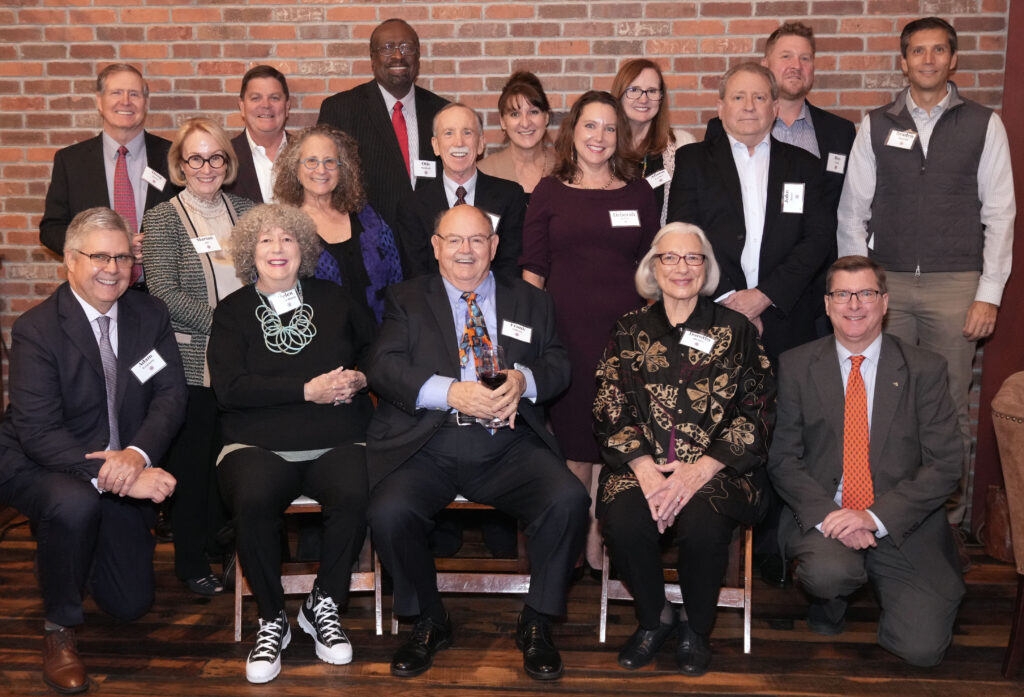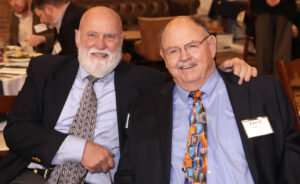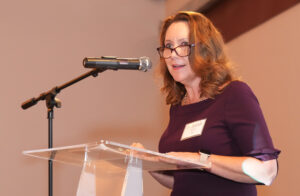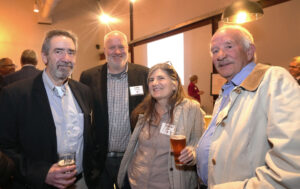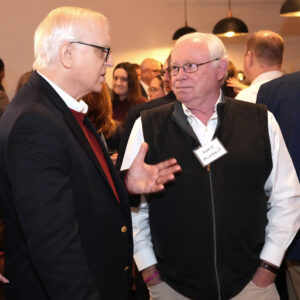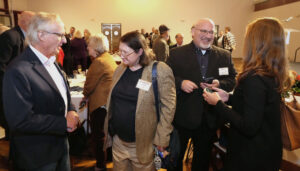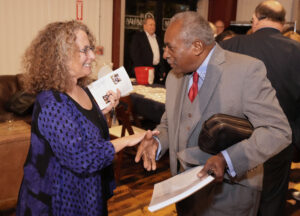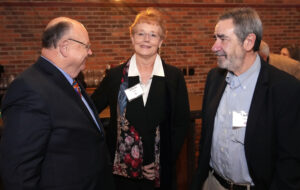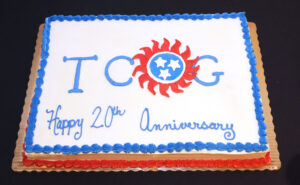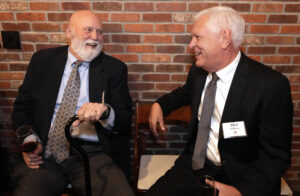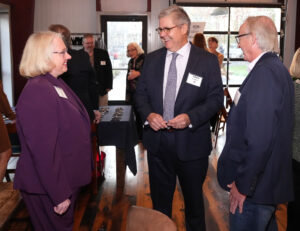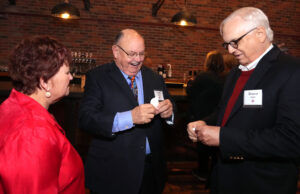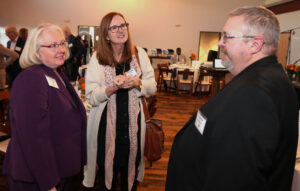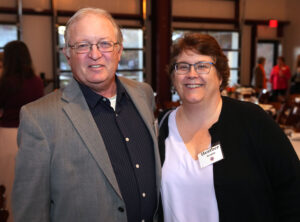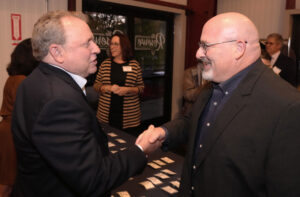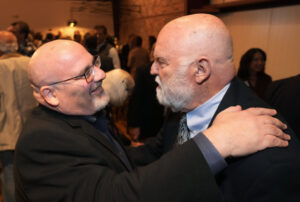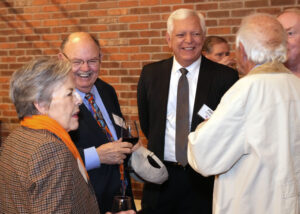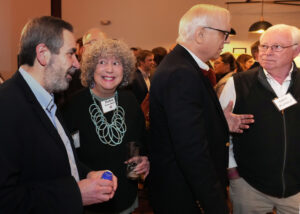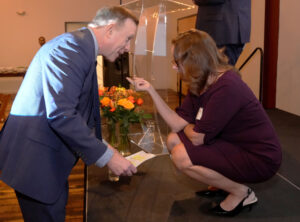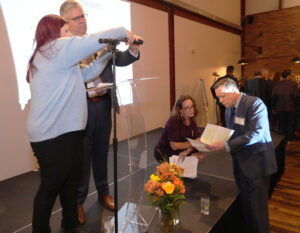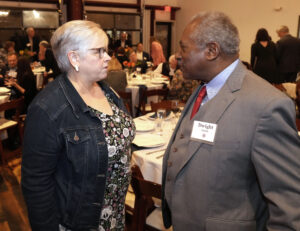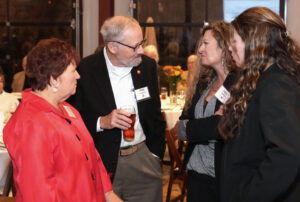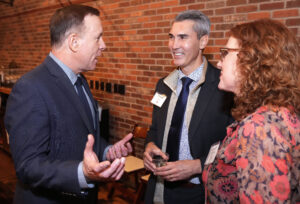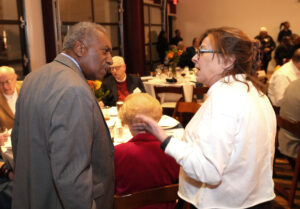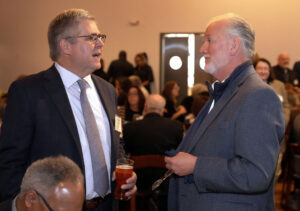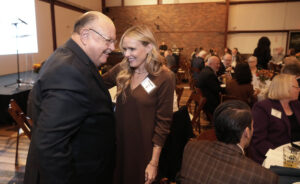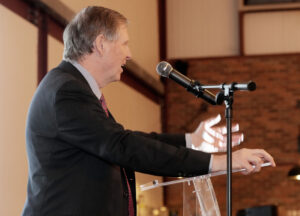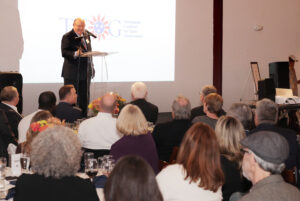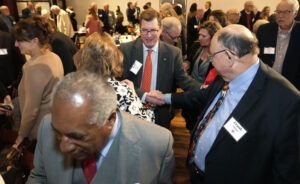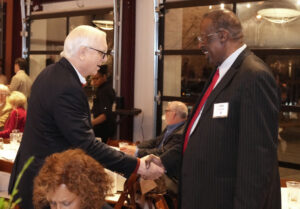TCOG was born from a demand for better government transparency in Tennessee
The story of the Tennessee Coalition for Open Government begins with the story of Frank Gibson.
Gibson, who grew up in rural West Tennessee, joined The Tennessean newspaper in Nashville out of high school. He worked there his entire journalism career, except for a hitch with the Armed Forces Radio and Television Service during the Vietnam War and a stretch at the University of Tennessee, where he was editor of The Daily Beacon.
At The Tennessean, Gibson was encouraged and supported by his editor Frank Sutherland and publisher John Seigenthaler to get involved with press freedom issues, particularly protecting against government efforts to shut down access to information and hide things from the public.
After being elected regional director of the Society of Professional Journalists in 1982, Gibson launched his first campaign to improve the nuts-and-bolts access to government information. Working with Sam Kennedy, chair of the Tennessee Press Association’s Government Affairs Committee and publisher of the Columbia Daily Herald, Gibson helped change the law in 1984 to force quicker court hearings whenever officials refused to give access to public records. He built on that success over the next two decades, assembling ever-larger coalitions of citizens to fight for open government.
For example, he organized a group of newspaper and TV journalists to lobby Gov. Ned McWherter to oppose a bill pushed by police chiefs to close vital records. The legislation was quashed.
He chaired Project Watchdog, SPJ’s $1 million campaign to educate the American people on the importance of a free press.
When he was elected national president of SPJ, he launched Project Sunshine, a nationwide grassroots effort aimed at maintaining open records and open meetings laws.
He also began to chair the Tennessee Press Association’s Freedom of Information Committee and, eventually, joint meetings of the organization’s FOI and government affairs committees.
Throughout these two decades, he found himself fielding more and more calls from people struggling with access issues, giving him a statewide inside look at the problems journalists and ordinary citizens were facing in their communities.
TCOG’s founding year in 2003
In 2002, a challenge emerged that directly led to TCOG’s founding.

We are grateful to several organizations that sponsored TCOG’s 20th Anniversary event in November 2023.
A Chattanooga TV station was denied access to photographs of police officers who had been suspended when a prisoner they were transporting died. The TV station sued in state court under the state’s public records law and a well-financed out-of-state police union stepped in and had the case moved into federal court, arguing that the officers’ privacy rights were threatened.
Gibson feared that a federal judge might declare Tennessee’s public records law unconstitutional. So he asked First Amendment lawyers across the state to get involved: Alan Johnson and Doug Pierce from Nashville, Rick Hollow from Knoxville, and Bud Jackson in Chattanooga. The group was successful in getting the case removed from federal court and back into state court. There, the TV station won access to the photos.
For Gibson, the case demonstrated the need for a permanent body to work in a coordinated way to fight for open government across Tennessee, closely monitoring problems. With like-minded colleagues, Gibson set out to create TCOG.
A steering committee was formed in February 2003 with press association president Ron Fryar of the Franklin Review-Appeal as chair. Its members were Gibson; Johnson from the law firm of Willis & Knight; Pierce from the law firm of King and Ballow; Robb Harvey from the law firm of Waller Lansden Dortch and Davis; Steve Lake of the Pulaski Citizen; Jennifer Peebles of The Tennessean; Tom Griscom of the Chattanooga Times Free Press; Frank Trexler of the Maryville Daily Times; Jack McElroy of the Knoxville News Sentinel; Kent Flanagan of The Associated Press; and Dr. Dorothy Bowles of the University of Tennessee School of Journalism and Electronic Media, who stepped up to serve as secretary of the organization.
In May of that year, the National Freedom of Information Coalition held its annual conference in Nashville. The Tennessee Press Association Foundation supplied a $5,000 grant to help underwrite the conference. The conference galvanized some of the Tennessee attendees, providing a core group for the Tennessee initiative.
That same month, Johnson filed articles of incorporation for TCOG. The original directors were Fryar, Bowles, Pierce, Flanagan and Lake.
TCOG’s structure was modeled after a similar open government group that had recently formed in Virginia. At the time, the press was active in several states forming coalitions to fight to maintain access to public records and meetings. Most of the new organizations drew their financial support from newspapers and TV and radio stations. But, like Virginia, TCOG wanted to make sure from the beginning that it would involve regular citizen supporters for transparency as well, creating a broader coalition that went beyond the traditional press. It is citizens who have the ultimate stake in open government and TCOG’s founders recognized that the press and citizens working together would be the best team to preserve open government against threats.
The next month in June, the steering committee met in Chattanooga and established its first goal: a statewide audit of compliance with the Tennessee Public Records Act. The audit would introduce TCOG to the state and build support for its mission. Bowles and Flanagan co-chaired the massive 95-county effort. Bowles, the UT professor, designed the research and collected and analyzed the data. Flanagan distributed the results through The Associated Press.
The committee also approved bylaws in preparation for its filing in August with the IRA for tax exemption status as a 501(c)(3). Lake and Gibson opened a TCOG bank account.
In November, the steering committee met in Knoxville. Bowles had applied for and was awarded $1,020 from the University of Tennessee for audit expenses, and the East Tennessee Chapter of SPJ had awarded the new organization $500, providing the TCOG bank account with early deposits.
At the same meeting, the steering committee selected Gibson to be executive director on a part-time basis, beginning in 2004 if The Tennessean, where he was still working, granted his request for part-time status.
Momentum builds in TCOG’s early years
In January 2004, Pierce and Lake drafted a staffing memo that spelled out the duties of the executive director, which fell into five categories: legislation, litigation, special projects, communications and fundraising.
The steering committee met again in Nashville in February. By then, the bank balance stood at $37,460.25, which included $10,000 from the TPA Foundation as half of its pledge for 2004 and a $10,000 start-up grant from NFOIC, which had held its conference in Nashville the year before.
The IRS had issued a “determination letter” that 501(c)(3) status was under review. This allowed TCOG to begin operating as a non-profit. A website domain – www.tcog.info – had been registered (tcog.org was unavailable, already in use by The Church of God in South Korea).
Gibson reported that The Tennessean agreed to reduce his salary and allow him to work two days a week for TCOG. He officially started on June 1, drafting a column for the TPA’s Tennessee Press newspaper announcing that TCOG was in business. Bowles and Gibson began recruiting audit volunteers during workshops at TPA’s winter convention in Nashville.
Around that time, TCOG also had received its first request to lend its name to litigation, a case involving the Cookeville Police. The board agreed to sign on.
Fryar stepped down as chairman of the steering committee, and Griscom, editor and publisher of the Chattanooga Times Free Press, was elected as interim TCOG board president. Griscom was succeeded by Pierce in 2008. Attorney Lucian Pera of the law firm of Adams and Reese was elected the current president in 2016.
In May 2004, TCOG held its first official board meeting in Nashville. Charter board members were Griscom, Flanagan, Lake, McElroy, Fryar, Bowles, Pierce, Harvey, Peebles, Tennessean editor Frank Sutherland and Chris Fletcher of the Daily Herald in Columbia. Board seats were reserved for representatives of the TPA, The Commercial Appeal of Memphis, Jones Media Group of Greeneville, the Tennessee Library Association, the Tennessee Association of Broadcasters, Common Cause and the League of Women Voters.
A dues structure was adopted, and the board approved an operating budget of $2,012 per month, including salary and benefits, telephone, computer, mileage, postage and printing costs.
The 95-county public records audit
The new group’s first task was the audit. Over the next several months, Gibson, Bowles and other members recruited volunteer students, journalists and ordinary citizens across the state and began to train them on the audit process.
On Nov. 4 and 5, 2004, 112 auditors descended on government offices in all 95 Tennessee counties. They made the same simple requests: Let us see sheriff and police incident reports or crime logs for the past 24 hours, the most recent minutes of the local zoning board, and the “zero tolerance” reports that all school districts were required to keep available to the public.
The results were distressing. Although the records clearly should have been available to citizens under the state public records law, government officials refused the auditors’ requests a third of the time. As one sheriff deputy ignorantly put it: “John Q. Citizen” can’t just walk in and see a public record.
Bowles assembled and analyzed the data and turned the results over to a team of writers led by John Vass (Chattanooga Times Free-Press) and including reporters Leon Alligood (The Tennessean), Marc Perrusquia (The Commercial Appeal), Scott Barker (Knoxville News Sentinel), and Bob Gary (Chattanooga Times Free Press). Each reporter wrote a news story based on the results of one of the four types of offices audited. Flanagan distributed the stories to AP member newspapers throughout Tennessee.
Over November 25-28 – Thanksgiving week – every daily paper in the state published the four-part series, beginning each installment on Page 1 and prominently crediting TCOG. Many also carried editorials in the following days about the state of public records access in Tennessee.
TCOG had made its presence known. Gibson began fielding dozens of calls for advice, conducting training sessions and lobbying against secrecy bills as they popped up in the legislature.
In 2005, Gibson retired from The Tennessean, dedicating himself full-time to TCOG (even though he still was paid as a part-time employee).
Tennessee Waltz scandal leads to more reform
That same year, an unexpected opportunity arose. FBI and Tennessee Bureau of Investigation agents arrested several state legislators in a bribery sting dubbed Operation Tennessee Waltz. During the wave of reform that followed, TCOG rushed in a plan to improve the state’s open government laws. The proposal hit resistance during a special session, but lawmakers agreed to appoint an interim study committee.
The study took two years. Local politicians wanted to amend the Sunshine Law, which governed public meetings, to allow more secrecy. Gibson and TCOG worked with then-Sen. Randy McNally to sideline that effort and address only the Public Records Act. The resulting bill, which passed the legislature in 2008, forced local governments to be much more responsive when citizens asked to see records. Among other things, the bill set a time frame for the government to respond to records requests and required a government entity that denied access to provide the basis for denial.
Then-Gov. Phil Bredesen took the reforms a step further. Prompted by Adam Yeomans, who by then oversaw The Associated Press in Tennessee and was a member of the TCOG board, the governor created the Office of the Open Records Counsel, an ombudsman who could provide training and help enforce the new, tougher transparency law. For the first time, an umpire was calling balls and strikes when Tennesseans wanted to find out what their government was doing.
In the years that followed, Gibson continued to lead TCOG as its reputation grew. He fielded more than 200 inquiries a year from journalists and citizens needing help, fought countless battles before the legislature, wrote dozens of columns and op-eds, and conducted formal and informal training sessions across the state.
Fisher hired as TCOG’s executive director in 2013
In 2011, the TPA recruited Gibson to be its public policy director. Flanagan, who had retired from the AP, briefly replaced Gibson. Then Deborah Fisher, a former E.W. Scripps Co. editor and former senior editor for news at The Tennessean, was hired as TCOG’s executive director.
Gibson and Fisher made a powerful team. Gibson wrote and Fisher edited “Keys to Open Government,” a citizen’s guide to the records and open meetings laws. It was published in 2015 with a grant from the TPA Foundation.
TCOG’s impact on the public’s consciousness was apparent in September 2015 when hearings were held across the state on a proposal to let local governments charge citizens to look at public records. Scores of Tennesseans spoke up at the meetings and hundreds commented online or in writing. Their loud and clear objections convinced lawmakers to abandon the proposal.
Under Fisher’s leadership, TCOG has continued its research and education initiatives.
In 2018, the group produced a public records policy audit of 306 counties, school districts and cities, which found that many governmental bodies had adopted rules that threatened access to public records. In 2019, Fisher authored a white paper examining when citizens can be charged labor fees to inspect public records.
Responding to concerns that exemptions were eroding the Public Records Act, the Office of Office of Open Records Counsel produced a report in 2018 that identified 538 statutory exceptions to the access law. In response, the legislature created the Open Records Ad Hoc Committee tasked with modifying or deleting exemptions. TCOG provided the committee with recommendations to change the process for adopting exemptions and detailed 13 exemptions or categories of exemptions that were interfering with the public’s right to know.
In 2019, the legislature added a new section to the Public Records Act requiring that all future exceptions be reviewed by the House government operations committee. This provided TCOG with a critical window to monitor secrecy legislation.
During the COVID pandemic in 2020, Fisher conducted a survey to document the state’s widespread experience with electronic meetings, which were temporarily allowed by an executive order of Gov. Bill Lee. TCOG subsequently tracked legislation that would have allowed the continued use of remote and virtual meetings and helped defeat measures that would have undermined public access to government meetings.
Throughout the years, TCOG has doggedly “played defense,” lobbying against legislation that would add exemptions to the Public Records Act and weaken the Open Meetings law.
But the group also has continued to play offense, fighting for laws to improve citizen access.
In 2023, TCOG worked with lawmakers to pass legislation that requires city and county legislative bodies to produce accurate and complete public agendas at least 48 hours before any meeting. The legislature also added a section to the Open Meetings Act requiring governing bodies to include public comment periods to allow citizens to weigh in “on matters that are germane to the items on the agenda.” In 2024, the agenda requirement was expanded to include state government councils and commissions. Also in 2024, a provision was added to the open meetings law allowing citizens to recover attorney costs in certain cases when they won an open meetings lawsuit.
After more than two decades of operation, TCOG remains a lean operation. Its expenses in 2023 were under $100,000. But it is recognized statewide, by citizens and public officials alike, as Tennessee’s pre-eminent source of expertise and advocacy for the public’s right to know.
Highlights of the past 20 years:
- 2004 – Trained 112 citizens and journalists to conduct a statewide audit in all 95 counties on requests for commonplace public records. The requests were denied one-third of the time. The results prompted the Legislature to create a study committee.
- 2008 – Study committee’s suggestions resulted in new laws requiring the government to cite the basis for a public records denial and creating the Office of Open Records Counsel.
- 2014 – 2023 – Began publishing annual legislative reports on website.
- 2015 – Mounted successful campaign against proposed legislation to get rid of the “free inspection” option for public records, helping drive turnout at three public hearings across the state.
- 2015 – Published the first ever citizen’s guide to Tennessee’s public records and open meetings laws, Keys to Open Government, which can be downloaded for free at www.tcog.info.
- 2017 – Worked with lawmakers and law enforcement to narrow a proposed exemption to the body camera footage.
- 2018 – Audited public records policies of 306 counties, school districts and cities, finding many had adopted hurdles slowing down or thwarting access to public records, including prohibiting citizens from taking picture of records. The information led to the Joint Government Operations Committee requiring state agencies to allow taking photos of records.
- 2018 – Provided report to legislative Joint Open Records Ad Hoc Committee, which recommended changes in how exemptions are adopted, including an extra House committee review.
- 2020 – Wrote successful application for Tennessee to be selected as one of five states for Reporters Committee Freedom of the Press Local Legal Initiative, giving journalists a new source of free legal counsel.
- 2020-21 – Worked with governor’s office on electronic public meeting protocols during COVID-19. Coordinated joint petition to Tennessee Supreme Court about public/electronic access to courts during the pandemic.
- 2022-23 – Proposed bills that became law, including one designed to eliminate vague meeting agendas and another requiring better public records on inmate deaths.

